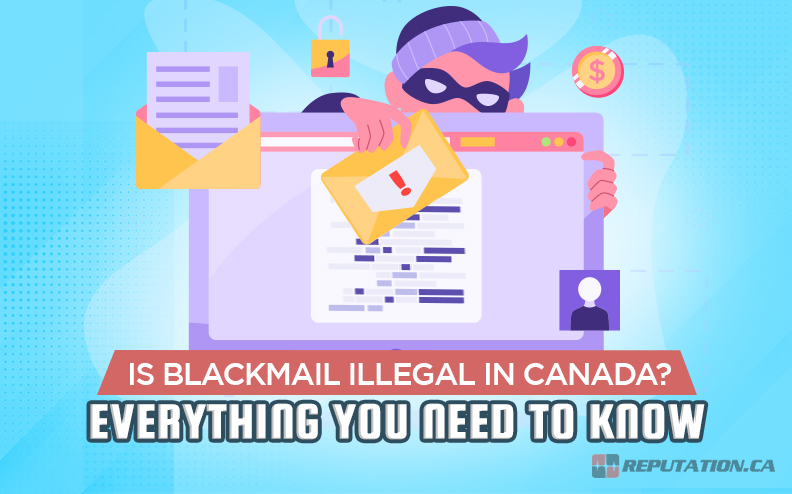Our society is extremely devoted to maintaining a public image that allows us to maintain interpersonal connections and focus on our professional standing. Unfortunately, anyone who claims that human beings are perfect is lying or in denial since everyone makes mistakes. Some mistakes are more serious than others, but they all impact how others perceive us.
Once upon a time, discovering someone’s darkest secrets was a major challenge since there were fewer avenues for gathering information. In modern society, information technology and social media have empowered us to find details about people we only know in passing. Depending on the person, the information surrounding them can be bland and unimportant, or it could devastate them if it was ever made public.
Plenty of people would love to take advantage of our private information for personal gain. One of the most common examples of this behavior is blackmail, a tried-and-true tool for lowlifes getting what they want from influential or powerful individuals. Blackmail can destroy lives if the information is severe enough, which increases the “value” of certain information.
The idea of someone taking past mistakes and leveraging them against us is despicable, but it happens more often than we care to admit. Considering the consequences of this practice, one must wonder whether Canada has laws to punish blackmailers. The answer to that question can drastically alter your response if you ever face blackmail threats.
What is Blackmail?
If you have never heard the term “blackmail” before, you might be disadvantaged in our increasingly cutthroat society. Considering the economic situation in most countries, people are desperate to get ahead however they can. Some choose to work extra shifts or sell valuable belongings, whereas others turn to crime to steal the resources they need.
The truly despicable use blackmail to take resources from others by airing out their dirty laundry. Blackmail is a threat of coercion in which one or more people threaten to expose information about their victim. This information could be verifiably true or, in some cases, outright lies that can tarnish our public image despite the lack of evidence.
Blackmailers do not expose this information for fun or because they have nothing better to do. Rather, they threaten the victim with this information and give them an avenue to prevent the information from spreading. This avenue involves the victim meeting certain demands that suit the blackmailer’s needs or desires.

The most common form of blackmail is threatening to expose an otherwise suppressed secret unless the victim pays a ransom. If the victim fails to provide, the blackmailers might expose the information publicly (though they also limit themselves to telling the victim’s family members or spouse). For example, say a man named John Smith is having an affair and risks losing his marriage and half his assets should his wife learn the truth.
A blackmailer (usually in these cases, it is the extramarital lover) might leverage evidence of the affair and demand a monetary ransom in exchange for not telling John’s wife. If John pays the blackmailers, he might save his marriage at the cost of a significant portion of his finances (though sometimes the blackmailers expose the secret anyway or use it to get repeat payments from the same victim). If he does not pay, the blackmailers expose his secret and let his life fall apart.
Other details can be used to blackmail people, such as minor crimes or an affiliation with unsavory organizations. Regardless of the information used against them, blackmail allows someone to take from their victim by threatening to spread information. Sometimes, it is not information but photographs or video footage of the victim in compromising positions (i.e., nude photographs of a woman who does not want her body exposed).
Who Can Be Blackmailed?
Our society, as loathe as we are to admit it, has a clear hierarchy of citizens who have more power than others. Members of the “elite” are viewed as untouchable by many of their fans and followers, primarily because of their continued success. One of the main demographics this idolization applies to are celebrities like actors and singers.
Unfortunately, fame and fortune do not dissuade blackmailers since there have been multiple incidents where celebrities were blackmailed or faced attempted blackmail.

Some notable examples include:
- David Boreanaz: An actor renowned for his roles in shows like Buffy the Vampire Slayer (and its spin-off Angel) and Bones, Boreanaz was blackmailed. An unnamed woman blackmailed Boreanaz to reveal his infidelity to his wife, or the woman would expose the relationship herself. While no ransom was demanded, the affair was leveraged to force Boreanaz to confess.
- Cameron Diaz: Like Boreanaz, Diaz is a famous actress with multiple awards for her performance. Unfortunately, a photographer named John Rutter threatened to publish topless photographs of Diaz unless she paid him $3,500,000.00 to return them. Fortunately, Rutter’s blackmail attempt failed, and Diaz was spared.
- John F. Kennedy: This particular incident of blackmail was never fully proven, but there have been countless claims that the former chief of the American Federal Bureau of Investigation (FBI) blackmailed then-president Kennedy. Allegedly, Hoover blackmailed Kennedy to prevent the president from terminating his position in the FBI. Again, this has never been proven, but there have been other accusations against Hoover concerning blackmail attempts, lending credulity to the theory.
Ultimately, no one is immune to blackmail, and it is possible that the president of the United States of America could be a victim. Blackmail is one of the most nefarious acts in modern society since it helps complete strangers keep others under their thumb. The biggest problem is that many instances of blackmail are situations that have little impact on the victim’s future anymore.
For example, some people were blackmailed to have their homosexuality exposed at a time when such a sexual orientation was considered a reputation killer. Nowadays, homosexuality is widely accepted and no longer profoundly impacts your societal standing. Unfortunately, this was a common blackmail tool against celebrities and common citizens for decades.
Is Blackmail Illegal in Canada?
While blackmail is a worldwide issue, it falls to each nation to pass laws on a federal scale (though states and provinces tend to have freedom regarding certain issues). While most people tend to look at countries like America, France, or China when assessing hot-button topics, other countries are equally important in spearheading criminal policies.
Here in Canada, we tend to share a few legal concepts with our neighbors to the south but remain autonomous and have just as many unique legal policies. Insofar as blackmail is concerned, we agree with our American neighbors that it is 100% illegal to blackmail another Canadian citizen. In Canada, blackmail is considered a type of extortion, a major criminal offense in most developed countries.

The Canadian Criminal Code outlines extortion (and, by extension, blackmail) under the following law:
“346 (1) Every one commits extortion who, without reasonable justification or excuse and with intent to obtain anything, by threats, accusations, menaces or violence induces or attempts to induce any person, whether or not he is the person threatened, accused or menaced or to whom violence is shown, to do anything or cause anything to be done.
Extortion
(1.1) Every person who commits extortion is guilty of an indictable offence and liable
(a) if a restricted firearm or prohibited firearm is used in the commission of the offence or if any firearm is used in the commission of the offence and the offence is committed for the benefit of, at the direction of, or in association with, a criminal organization, to imprisonment for life and to a minimum punishment of imprisonment for a term of
(i) in the case of a first offence, five years, and
(ii) in the case of a second or subsequent offence, seven years;
(a.1) [Repealed, 2022, c. 15, s. 13]
(b) in any other case, to imprisonment for life.
Subsequent offences
(1.2) In determining, for the purpose of paragraph (1.1)(a), whether a convicted person has committed a second or subsequent offence, if the person was earlier convicted of any of the following offences, that offence is to be considered as an earlier offence:
(a) an offence under this section;
(b) an offence under subsection 85(1) or (2) or section 244 or 244.2; or
(c) an offence under section 220, 236, 239, 272 or 273, subsection 279(1) or section 279.1 or 344 if a firearm was used in the commission of the offence.
However, an earlier offence shall not be taken into account if 10 years have elapsed between the day on which the person was convicted of the earlier offence and the day on which the person was convicted of the offence for which sentence is being imposed, not taking into account any time in custody.”
Not only is blackmail illegal under Canadian law, but it is also severely punished with increasing penalties with every subsequent offense. Unfortunately, the law does not inhibit the consequences blackmail has on your societal standing. Considering some of the information employed in blackmail attempts, protecting your reputation from the ramifications can be difficult.
What Does Blackmail Do to Your Reputation?
Our reputation presents an interesting phenomenon in that our public image requires hard work and dedication to cultivate. We must work for years to earn the trust and respect of those around us, both professionally and personally, and create the reputation we desire. Unfortunately, years of hard work building our reputation can be undone with frighteningly little effort since one wrong move can destroy the public’s approval of you.
Having your dirty laundry aired out can cause your customers, fans, friends, and family members to abandon you if the offense is great enough. Even more concerning is that the accusation alone is enough to damage your reputation. Our society has adopted a “guilty until proven innocent” mentality despite the Canadian Charter of Rights and Freedoms clearly stating the inverse.

Additionally, the rise of social media platforms means idle rumors can spread like wildfire and reach worldwide audiences within 48 hours. While some individuals are actively followed internationally, this spread is even faster when restricted to audiences within the same nation. Suppose someone discovers you previously took risqué photographs for an ex, and that same ex threatens to release them unless you pay them or take them back.
If you refuse and the images spread, you might be labeled as a “slut” or given a similar derogatory title (although this phenomenon primarily affects women). Alternatively, if you pay off the blackmailer and the public learns this, it causes certain sympathies to evaporate since many believe that acquiescing to a blackmailer means 2 things:
- You have something nefarious to hide.
- You are encouraging future blackmailers by giving one success.
The impact of blackmail on your reputation can be devastating, but it is possible to overcome. The only caveat is that you might need help avoiding the damage.
Take Your Reputation Back!
Blackmail is one of the cruelest crimes one can commit and often devastates the victim’s life. Unfortunately, it is difficult to bring a blackmailer to justice since they either cover their tracks or any attempt to have them prosecuted exposes the information they were threatening to release.
Either way, blackmailers tend to win somehow unless you can get ahead of what the information can do to you. A major aspect of overcoming blackmail is preemptively securing your reputation by managing the different details that comprise it. Unfortunately, this task can be too much for individuals or small groups.

We at Reputation know how easy it is for one accusation or mistake to destroy everything you have built. That is why we have made it our mission to help our clients manage their reputations and reduce the risks associated with blackmail. While we cannot bring a blackmailer to justice, we can reinforce your public image by curating social media accounts and producing new content to outrank anything a blackmailer publishes. There are no shortcuts concerning your public image, so visit our website today and take your reputation back!
Do you have any questions about blackmail, how to preemptively secure your reputation from blackmail, or anything similar? If so, please feel free to let us know at any time, and we’d be more than happy to assist you however we can.







